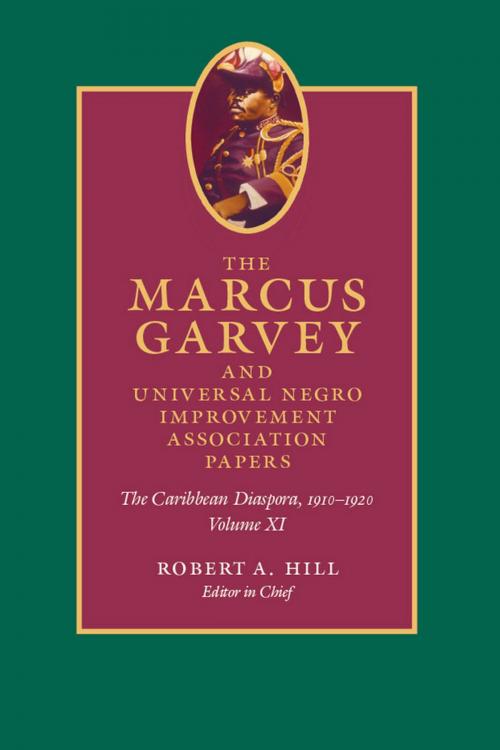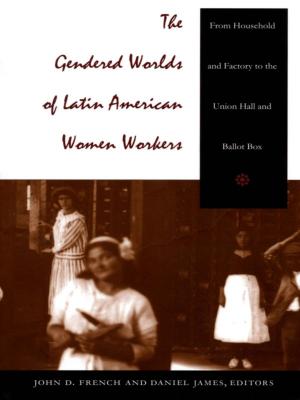The Marcus Garvey and Universal Negro Improvement Association Papers, Volume XI
The Caribbean Diaspora, 1910–1920
Nonfiction, History, Americas, Caribbean & West Indies, Social & Cultural Studies, Social Science, Cultural Studies, African-American Studies, United States, 20th Century| Author: | Marcus Garvey | ISBN: | 9780822392729 |
| Publisher: | Duke University Press | Publication: | July 15, 2011 |
| Imprint: | Duke University Press Books | Language: | English |
| Author: | Marcus Garvey |
| ISBN: | 9780822392729 |
| Publisher: | Duke University Press |
| Publication: | July 15, 2011 |
| Imprint: | Duke University Press Books |
| Language: | English |
With Volume XI: The Caribbean Diaspora, 1910–1920, Duke University Press proudly assumes publication of the final volumes of The Marcus Garvey and Universal Negro Improvement Association Papers. This invaluable archival project documents the impact and spread of the Universal Negro Improvement Association (UNIA), the organization founded by Marcus Garvey in 1914 and led by him until his death in 1940. Volume XI is the first to focus on the Caribbean, where the UNIA was represented by more than 170 divisions and chapters. Revealing the connections between the major African-American mass movement of the interwar era and the struggle of the Caribbean people for independence, this volume includes the letters, speeches, and writings of Caribbean Garveyites and their opponents, as well as documents and speeches by Garvey, newspaper articles, colonial correspondence and memoranda, and government investigative records. Volume XI covers the period from 1911, when a controversy was ignited in Limon, Costa Rica, in response to a letter that Garvey sent to the Limon Times, until 1920, when workers on the Panama Canal undertook a strike sponsored in part by the UNIA. The primary documents are extensively annotated, and the volume includes twenty-two critical commentaries on the territories covered in the book, from the Bahamas to Guatemala, and Haiti to Brazil. A trove of scholarly resources, Volume XI: The Caribbean Diaspora, 1910–1920 illuminates another chapter in the history of one the world’s most important social movements.
Praise for the Previous Volumes:
“The Marcus Garvey and Universal Negro Improvement Association Papers will take its place among the most important records of the Afro-American experience. . . . ‘The Marcus Garvey Papers’ lays the groundwork for a long overdue reassessment of Marcus Garvey and the legacy of racial pride, nationalism and concern with Africa he bequeathed to today’s black community.”—Eric Foner, the New York Times Book Review
“Until the publication of The Marcus Garvey and Universal Negro Improvement Association Papers, many of the documents necessary for a full assessment of Garvey’s thought or of his movement’s significance have not been easily accessible. Robert A. Hill and his staff . . . have gathered over 30,000 documents from libraries and other sources in many countries. . . . The Garvey papers will reshape our understanding of the history of black nationalism and perhaps increase our understanding of contemporary black politics.”—Clayborne Carson, the Nation
“Now is our chance, through these important volumes, to finally begin to come to terms with the significance of Garvey’s complex, fascinating career and the meaning of the movement he built.”—Lawrence W. Levine, the New Republic
With Volume XI: The Caribbean Diaspora, 1910–1920, Duke University Press proudly assumes publication of the final volumes of The Marcus Garvey and Universal Negro Improvement Association Papers. This invaluable archival project documents the impact and spread of the Universal Negro Improvement Association (UNIA), the organization founded by Marcus Garvey in 1914 and led by him until his death in 1940. Volume XI is the first to focus on the Caribbean, where the UNIA was represented by more than 170 divisions and chapters. Revealing the connections between the major African-American mass movement of the interwar era and the struggle of the Caribbean people for independence, this volume includes the letters, speeches, and writings of Caribbean Garveyites and their opponents, as well as documents and speeches by Garvey, newspaper articles, colonial correspondence and memoranda, and government investigative records. Volume XI covers the period from 1911, when a controversy was ignited in Limon, Costa Rica, in response to a letter that Garvey sent to the Limon Times, until 1920, when workers on the Panama Canal undertook a strike sponsored in part by the UNIA. The primary documents are extensively annotated, and the volume includes twenty-two critical commentaries on the territories covered in the book, from the Bahamas to Guatemala, and Haiti to Brazil. A trove of scholarly resources, Volume XI: The Caribbean Diaspora, 1910–1920 illuminates another chapter in the history of one the world’s most important social movements.
Praise for the Previous Volumes:
“The Marcus Garvey and Universal Negro Improvement Association Papers will take its place among the most important records of the Afro-American experience. . . . ‘The Marcus Garvey Papers’ lays the groundwork for a long overdue reassessment of Marcus Garvey and the legacy of racial pride, nationalism and concern with Africa he bequeathed to today’s black community.”—Eric Foner, the New York Times Book Review
“Until the publication of The Marcus Garvey and Universal Negro Improvement Association Papers, many of the documents necessary for a full assessment of Garvey’s thought or of his movement’s significance have not been easily accessible. Robert A. Hill and his staff . . . have gathered over 30,000 documents from libraries and other sources in many countries. . . . The Garvey papers will reshape our understanding of the history of black nationalism and perhaps increase our understanding of contemporary black politics.”—Clayborne Carson, the Nation
“Now is our chance, through these important volumes, to finally begin to come to terms with the significance of Garvey’s complex, fascinating career and the meaning of the movement he built.”—Lawrence W. Levine, the New Republic















